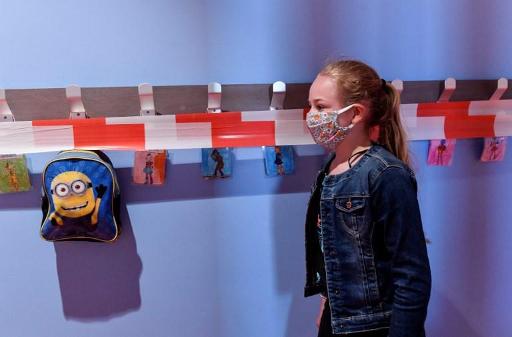From next week, all pupils in Belgium are set to return to the classroom, after authorities approved the return to on-site teaching in a balancing act between coronavirus concerns and children's education.
The National Security Council (NSC) approved a plan unveiled in June by Belgium's three education ministers to send all pupils back to school under a four-level colour-coded risk system.
Education officials had then said that Belgian schools would likely reopen under the yellow scenario, the second-lowest risk level which indicates low risks of viral transmission, a decision which was maintained for next week's return to class.
While officials are yet to define the alarm threshold which would warrant a shift into a lower or higher risk scenario, here are the measures that will apply under the current yellow-scenario.
Which pupils?
The yellow scenario allows for all students in primary and secondary education to return to school for on-site teaching all five days of the week.
Children who belong to an at-risk group, those who risk developing serious symptoms if infected with the new coronavirus, are the only ones who may be allowed to continue distance-learning from home.
Pupils who return from holidays in a zone classed as red or high-risk by Belgium's foreign affairs office are still subject to a mandatory 14-day quarantine.
Family doctors can issue the pupils' family with a quarantine certificate in order to justify their absence at school, De Morgen reports.
Schools can refuse that pupils who have been in these zones return to the classroom before completing the mandatory self-isolation period.
Under the yellow scenario, parents of pupils who return from holidays in a moderate-risk or orange zone are highly encouraged to get them tested, although this is not mandatory and schools cannot refuse these students from coming to class.
Related News
- Belgium's Security Council: 'Return to normal not yet possible'
- Back to school: Five days a week as usual
- Lockdown: Belgium sends all students back to school from September
Face masks
Pupils in primary school are not required to wear a face mask at any time, while primary school teachers are required to wear one only when it is not possible to respect social distancing guidelines.
The mandatory use of face mask applies to all pupils and staff in secondary school. Secondary school pupils may only remove their face mask during physical activities or playtime.
Parents and other adults dropping off children at school or entering the school grounds must wear a face mask at all times.
Lunch breaks, boarding schools and after-school childcare
Pupils who remain at school during the lunch break will have to remain within a defined bubble in school cafeterias.
Ater-school childcare will follow the same guidelines as before, when schools were closed and students were distance-learning but some school staff still supported parents working in essential professions who had no other childcare alternatives.
Boarding schools in the country will remain open and follow guidelines issued to them by the federal government for all four-risk scenarios outlined in June.
Grandparents, with a face mask, are allowed to pick up their grandchildren at school but it is recommended that families choose one grandparent to do so, until further notice.
School trips and excursions
All school trips and excursions in secondary school are cancelled except for swimming and other practical lessons.
In primary schools, school trips may still take place provided that staff guarantee that all safety measures can always be respected.
Officials in Brussels told Bruzz that, with the lack of clarity over the threshold at which a new risk scenario would be triggered, it was difficult for schools to know whether they could still hold planned outdoor activities in the fall.
Suspected outbreak
If an infection cluster is detected in a school, a contact tracing procedure will be triggered and only the class in which a suspected infection has been detected must be sent into quarantine.
Under current contact tracing procedures, tracers call the person who has tested positive for the coronavirus to ask for their recent close contacts, who are then contacted and potentially ordered to take a coronavirus test and self-isolate.
Contact tracers will then contact only the staff and the families of pupils who are suspected of having been in close contact with the suspected infected person or persons, while all other classes can continue as normal.
If a child gets sick during the school day, schools are instructed to immediately isolate them in a separate room until a caretaker can come to collect them.
The classroom and all areas with which the child has had contact will be disinfected and, if the child tests positive for the virus, a contact tracing procedure will be triggered.
Gabriela Galindo
The Brussels Times

